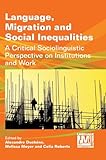Language, Migration and Social Inequalities : A Critical Sociolinguistic Perspective on Institutions and Work / ed. by Alexandre Duchêne, Melissa Moyer, Celia Roberts.
Material type: TextSeries: Language, Mobility and InstitutionsPublisher: Bristol ; Blue Ridge Summit : Multilingual Matters, [2013]Copyright date: ©2013Description: 1 online resource (280 p.)Content type:
TextSeries: Language, Mobility and InstitutionsPublisher: Bristol ; Blue Ridge Summit : Multilingual Matters, [2013]Copyright date: ©2013Description: 1 online resource (280 p.)Content type: - 9781783091003
- 9781783091010
- 306.44
- online - DeGruyter
| Item type | Current library | Call number | URL | Status | Notes | Barcode | |
|---|---|---|---|---|---|---|---|
 eBook
eBook
|
Biblioteca "Angelicum" Pont. Univ. S.Tommaso d'Aquino Nuvola online | online - DeGruyter (Browse shelf(Opens below)) | Online access | Not for loan (Accesso limitato) | Accesso per gli utenti autorizzati / Access for authorized users | (dgr)9781783091010 |
Frontmatter -- Contents -- Contributors -- 1. Introduction: Recasting Institutions and Work in Multilingual and Transnational Spaces -- Part 1: Sites of Control -- 2. Trade Unions and NGOs Under Neoliberalism: Between Regimenting Migrants and Subverting the State -- 3. Skilling the Self: The Communicability of Immigrants as Flexible Labour -- Part 2: Sites of Selection -- 4. The Gatekeeping of Babel: Job Interviews and the Linguistic Penalty -- 5. Language Work Aboard the Low-cost Airline -- 6. (De)capitalising Students Through Linguistic Practices. A Comparative Analysis of New Educational Programmes in a Global Era -- 7. From kebapçi to Professional: The Commodification of Language and Social Mobility in Turkish Complementary Schools in the UK -- Part 3: Sites of Resistance -- 8. ‘Integration hatten wir letztes Jahr’. Official Discourses of Integration and Their Uptake by Migrants in Germany -- 9. Language as a Resource. Migrant Agency, Positioning and Resistance in a Health Care Clinic -- 10. Informal Economy and Language Practice in the Context of Migrations -- 11. Fighting Exclusion from the Margins: Locutorios as Sites of Social Agency and Resistance for Migrants -- Postscript -- Index
restricted access online access with authorization star
http://purl.org/coar/access_right/c_16ec
Migration and the mobility of citizens around the globe pose important challenges to the linguistic and cultural homogeneity that nation-states rely on for defining their physical boundaries and identity, as well as the rights and obligations of their citizens. A new social order resulting from neoliberal economic practices, globalisation and outsourcing also challenges traditional ways the nation-state has organized its control over the people who have typically travelled to a new country looking for work or better life chances. This collection provides an account of the ways language addresses core questions concerning power and the place of migrants in various institutional and workplace settings. It brings together contributions from a range of geographical settings to understand better how linguistic inequality is (re)produced in this new economic order.
Mode of access: Internet via World Wide Web.
In English.
Description based on online resource; title from PDF title page (publisher's Web site, viewed 01. Dez 2022)


